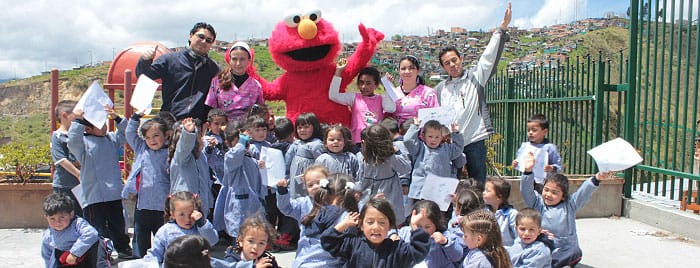Promote the development of healthy habits that persist into adult life, through leisure-educational activities focusing on nutrition, a healthy heart and the importance of physical exercise.
Promote the development of healthy habits that persist into adult life, through leisure-educational activities focusing on nutrition, a healthy heart and the importance of physical exercise.
Healthy Habits for Life
“In 2009 we educated and followed a sample of 1.250 from 3 to 7 years old colombian kids for three years. The plan is to follow the sample until year 2030. The winner in this project is obsessiveness.”
Dr. Valentín Fuster
Unhealthy lifestyle habits can lead to the development of cardiovascular diseases. Recent data suggest that lifestyle habits are acquired at an early age, specifically at around 3-8 years of age, and persist into adult life. To provide further data on children, Dr. Fuster, in collaboration with the famous television shows “Sesame Street” and “Plaza Sesamo”.

The aim of the program, targeted to children between 3-5 years of age, their parents and teachers, was to promote the development of healthy habits that persist into adult life, through leisure-educational activities focusing on nutrition, a healthy heart and the importance of physical exercise.
The study included 1,216 children aged 3 to 5 years, 928 parents, and 120 teachers from 14 schools. The participating schools were randomly divided into two groups (1:1). Seven schools were part of the intervention group for cardiovascular health promotion, while the other 7 schools were the control group, i.e., no intervention was performed in them (only a follow-up during the same time period to compare the results, though, once the study was ended, the students of these schools did receive a similar training
The children included in the intervention group received one daily hour of training on healthy lifestyles and on the function of the human body. Education was given by teachers (previously trained with the support of a guide with the materials of “Sesame Street”) using videos and board games (“heart game”), as well as through tales, songs and placing posters in classrooms with subjects related to health [1]. In addition, both children and parents and teachers participated in workshops lasting one hour a week (“Day of the healthy family”), where printed information was handed out about how to promote physical exercise or improve diet [9]. Parents were also given 3 workshops focused on promoting the consumption of healthy food and practicing sports. For instance, in areas with a poor access to parks or recreational facilities, the parents were trained to encourage their children to use stairs instead of elevators and to walk instead of taking the bus.
At the end of the intervention, the investigators documented a greater increase in the total score on the knowledge, attitude and healthy lifestyles in children participating in leisure-educational activities (+10.9%) as compared to children in the group not receiving this training (+5.3%). This increase was also greater in parents and teachers from the intervention group (+8.9% and + 9.4%) than in parents and teachers from the control group (+3.1% and +2.5%, respectively). In addition, in the intervention group this improvement in the knowledge and acquisition of healthy habits persisted in all cases after one year of ending the program [1].

After 3 years, the investigators evaluated again 598 children and 475 parents participating in the study. With regard to the time when the study was performed, an improvement of 15% was seen in the knowledge of the children, of 51% in their attitude towards the matter, and of 27% in their healthy lifestyles. In addition, the percentage of children with an adequate weight increased from 62% to 75% [2].
However, a re-intervention was made 7 years later to 596 children between 9 and 13 years old from the first study, and compared with a group of 620 children of the same age who had not been intervened in the preschool stage. No statistically significant differences were found between the groups after the intervention at 9-13 years old, so it seems important that re-intervention strategies are carried out at an earlier age to maintain a sustained effect of the preschool intervention [3].
References
Céspedes J, Fuster V et al. Am J Med, 2013, 126(1):27-35 e3. Targeting preschool children to promote cardiovascular health: cluster randomized trial.
Céspedes J,Fuster V et al. Am J Med, 2013, 126(12):1122-6. Promotion of cardiovascular health in preschool children: 36-month cohort follow-up.
Sustainability of and Adherence to Preschool Health Promotion Among Children 9 to 13 Years Old Fernández-Jiménez R, Fuster V et al. J Am Coll Cardiol, 2020, 75:13.

